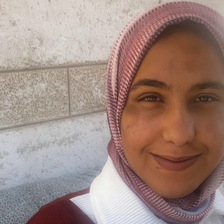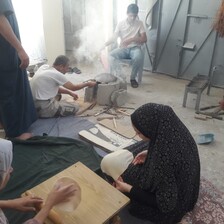The Electronic Intifada 30 May 2024

Displaced Palestinians walk along a devastated street in Khan Younis, southern Gaza, 28 May. (Naaman Omar / APA Images)
This April, I turned 29 years old. My husband and son also gained another year during this genocide, even though it feels like life has stopped since 7 October.
I still can’t believe that what has happened is real. I no longer know myself.
Part of me remains in the north, where my husband stayed, and the other part of me is in the south, where I’ve been forcibly displaced.
More than any place, my husband Ahmad is my home. Our physical home in northern Gaza is gone, destroyed by Israel, and unlike so many others who can recall every detail of their home, I can no longer remember much.
I would have to see photos.
Returning to the north feels like an impossible dream. Israel has divided tiny Gaza with military checkpoints and destroyed towns.
Still, though, after eight months, Israel doesn’t control Gaza entirely.
Ahmad is staying at what is left of his family’s home. They’ve cleaned it up to the extent that they can, and they live in one room.
He has told me that life there is hard: water is in short supply, and they still cook meals by fire.
He tries to stick to a daily routine, and he goes to sleep early out of sheer exhaustion.
I miss Ahmad but at least I know where he is. I cannot say the same for my father and brother.
Are they being tortured?
Israel kidnapped my father and brother in February from my uncle’s house in Khan Younis.
My father is 62 and my brother is 17, and I miss them so much it hurts.
Without my father around, any sense of security that I once had is lost.
And my brother. He is obsessed with bodybuilding and fashion – he loves to buy the best clothes and most expensive shoes.
He is full of optimism and dreams of traveling the world.
Where is he now? Where are they?
When a loved one is missing, taken by Israel, the questions that run through your mind are endless.
Are they hungry?
Are they being tortured?
Are they injured?
What does Israel want with them? Why is Israel so afraid of them, an elderly man and a teenager with no party affiliations?
I run through these questions and scenarios of torture in my head, and it doesn’t make the situation easier. It is agony.
I’ve joined all the WhatsApp and Telegram and Facebook groups for families of individuals taken by Israel. My sister keeps track of everyone taken and visits them when they return, to ask if they have seen our father and brother.
We haven’t heard any word about them or from them. We continue to wait for their return.
Forced out of Rafah
My son is now 16 months old, and we were in Rafah until recently. Now we are in Khan Younis, another southern Gaza city, living in a tent.
The Israeli occupation had been threatening to invade Rafah for months, and when they did, we were forced to leave.
This genocide is turning me into an entirely different person.
Before, I mostly felt like a free woman, even with the Israeli siege. I was afraid of life’s commitments, of what life would be like with the responsibilities of marriage and bearing children.
Now I’m a married woman with a child, no home and a father who was kidnapped.
I spent years studying at university to graduate with distinction, and I did. I spent years attending courses and volunteering until I got my dream job just one month before the war.
I feel like I lost all of these achievements at once.
I literally have nothing. I don’t even have my kindergarten certificate.
Yet even breathing and thinking is now a luxury, as Israel is stealing and killing the best souls every minute.
I’m so confused and lost and lonely. I can barely sleep, and the waves of thoughts that haunt me during the day do not stop at night.
I wish I could cut my attachment to Gaza and run. I wish I could hug my son and escape to anywhere else but here.
I wish I had no heart so I could leave peacefully without regret.
Hanin A. Elholy is a researcher, writer and translator based in Gaza.





